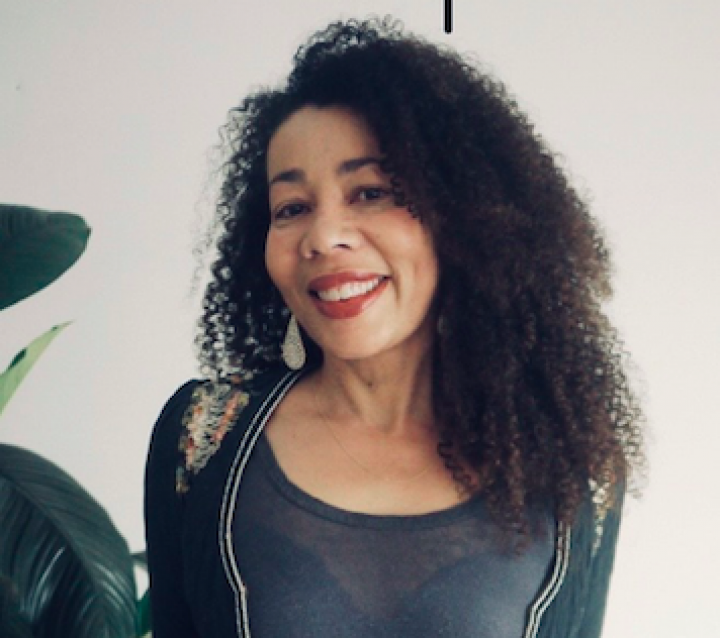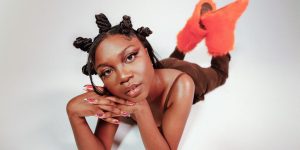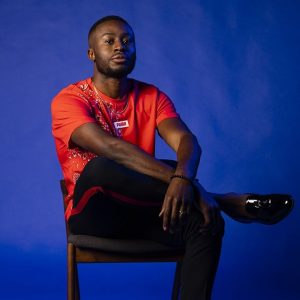Please tell us your story! How did you get to where you are today?
I’ve loved the arts for as long as I can remember, particularly music. Mum has always been involved in community theatre and singing groups, which is not surprising, she comes from a theatrical family who have a long history in Australian cinema. My great grandfather, EJ Carroll and his brother were among some of the early pioneers and entrepreneurs in the silent movie business, co-founding the Wintergarden and Birch, Carroll & Coyle theatres in QLD and the Prince Edward Theatre in Sydney. My dad’s West African creole music and culture is deeply imbedded into my psyche and contributes massively to how I view things and navigate my life.
As a child I spent most of my free time, choreographing dance routines, singing into my hairbrush, listening to American Top 40 and Aussie radio, making mixtapes. I aspired to be a singer and dancer but I wasn’t the best singer and very shy so becoming a performer wasn’t going to happen.
I finished school and stepped into the music industry in the late 80s, landing a role at Warner Chappell Music Publishers in accounts payable when the late John Bromell was MD. I was promoted to Print Music Assistant, then Print Music Coordinator, where I was responsible for reproducing sheet music singles and songbooks for WC songwriters on the ARIA top 20 singles and albums charts. It was an intense role at such a young age, my god, thinking back to that time, I was running on nervous energy, but I loved it. From Warner Chappell I moved over to the label Warner Music as National Promotions Assistant. What a fun and eye-opening experience.
I was starting to struggle with my identity and sense of belonging, being one of the very few Black people around at that time on the business side of things and the weirdness that is often associated with that. I ended up leaving Warner Music but did return after being asked to fill in for maternity leave cover in National Publicity and ended up staying on in a different role in the mechanical division, I think that’s what it was called back then, ha, I can’t remember. Later in my career, in the early 2000s, I also returned to Warner Chappell Music and worked in copyright.
By then, life for me had changed. I had a young family and the music industry was not family friendly. Though I sometimes found the industry harmful to my emotional wellbeing, the beauty of music, the creative people, the excitement, it was captivating. I found it difficult to settle into roles outside music.
In 2015, I returned to the industry, again. I got a job at APRA AMCOS in publisher relations and was later promoted to Member Services Project Administrator. I thought I knew about the music business having worked in publishing and a label but I literally only knew half the story of a song. I was involved in some great work as part of the Culture and Inclusion team to improve representation of culturally diverse members but sadly that chapter closed in 2020.
I decided to continue working to improve representation of the African diaspora in music and started my own small music business OURS. the Creative Hub in 2020. Not the wisest move during a pandemic and a large part of the industry shutting down but I did make some powerful inroads. Some of the projects I worked on led me to like-minded Black people in music and we co-founded the Black Music Alliance Australia (BMAA) where I now do most of my work.
“The Black Music Alliance Australia is the first grassroots, not-for-profit, representing People of the African diaspora in music. It was co-founded in 2020 by me and a group of changemakers who came together with a shared vision.”
What does your day-to-day entail?
It varies from day to day. I do some freelance admin work for an independent publisher but mostly it BMAA work. We don’t have a dedicated committee secretary yet so I do most of the work setting up and leading weekly meetings, creating agendas, minutes, budgets, etc. We’re busy planning to build the BMAA brand and services, relationships with our community, overseas and local partner relationships, funding opportunities and working on an upcoming event.
Please tell us about BMAA and the work the alliance will be doing, and why this is so important to the Australian music industry.
The Black Music Alliance Australia is the first grassroots, not-for-profit, representing People of the African diaspora in music. It was co-founded in 2020 by me and a group of changemakers who came together with a shared vision. We wanted to create something we wished had been available to us starting out—a space within the industry where Black people can come together and be part of a connected music community, collaborate, access educational resources and tools to navigate the industry and be celebrated for the incredibly talented creatives they are.
BMAA is managed by a committee of music creators and industry professionals and we have been meeting weekly for more than two years to get this thing off the ground. Everything we have achieved so far has been funded by us. We all volunteer our time/labour on top of other work commitments. It’s a learning curve and we are taking things slowly to ensure it’s sustainable. Our priorities right now are engaging with our community, hearing their feedback, building our member-base and marketing the BMAA brand and services. We have been building relationships with African Australians in music across the nation for some time now and recently partnered with Support Act on their webinar series On My Mind ‘Being Black in Australian Music’. BMAA is a MusicVIC partner and our international partners are Black Music Action Coalition (US), Black Music Coalition (UK) and Black Lives in Music (UK).
Advocacy will be another aspect of what we will do. The African Australian music scene is consistently growing and we are committed to working with the industry to ensure equal opportunity and equity. Our vision is to become a trusted not-for-profit among our community and the go-to for the broader music industry when it comes to anything related to African Australian and Black Music Culture.
The contribution People of the African diaspora have made and continue to make to the global music economy and music culture is undeniable and profound. The African Australian music culture is young and evolving, made up of People from different ethnicities with different histories, unlike the Americas and the UK where Black people mostly have shared history. We are looking forward to promoting economic and cultural development and being part of the evolution of a Black Music sub-culture that will eventually take its place under the umbrella of the global Black Music and Culture family.
Do you feel that higher education is a necessary step to enter the music industry?
I guess it depends what area of the industry. On the business side, yes, higher education seems to be a prerequisite but employers will miss out on amazing people who have music in their DNA if they are too tunnel visioned about all that. I have noticed many industry people are armed with multiple degrees but don’t have much knowledge of music history, specifically Black Music history. I would love to see music companies/orgs also place importance on their staff getting across it, particularly if they benefit from the mass consumption of Black Music and Culture. The more knowledge decision-makers have, the more inclusive and less harmful decisions they will make, surely.
Have you had to overcome any challenges or adversity in your career, and if so, how did you approach them?
Navigating the industry as a biracial-Black woman was and still is challenging. I have always had a level of anxiety walking into spaces where there isn’t a single person who looks like me. Yes, ok, I enjoy being different sometimes, but mostly it’s isolating and disrupts my sense of belonging. How do I approach it? Pretending I am completely fine which is an art I’ve mastered since childhood. Seeing more African Australians, Aboriginal and Torres Strait Islander People and other POC enter these spaces is cool. Very cool.
“Navigating the industry as a biracial-Black woman was and still is challenging. I have always had a level of anxiety walking into spaces where there isn’t a single person who looks like me.”
Who are your role models in the industry be they international or locally-based?
I have great respect for anybody Black working in predominantly white spaces. When I see them, I feel like hugging the life out of them, but I don’t want to be that crazy auntie.
Who are your top 3 artists or producers to watch?
Let’s talk about the highs vs the lows of your career, what is your greatest achievement vs a moment you’d prefer to forget?
Completing a DipEd in Copyediting and Publishing in the mid-2000s at the same time as navigating motherhood and working part-time was a stand-out high. The timeframe was one year. It took me three years! I nearly gave up multiple times but knew I would hate myself so kept pushing through. Ah the lows, boo! There have been a few lows. Not going to lie, they can be crushing. I like to think I’ve learned something from those.
What is your greatest lesson or piece of advice you’ve received?
“Music and the music business are two different things” Erykah Badu
“Music and the music business are two different things” Erykah Badu”
Who has been your greatest champion in your career, who has helped you along the way?
There have been a few beautiful souls along the way but I’m going to start at the beginning and acknowledge the late John Bromell, for opening doors and encouraging me to take on roles that, at the time, I was totally intimidated by and didn’t think I was ready for. He threw me in the deep end. And that’s where my love of music publishing and the broader industry began.
What do you think is the biggest threat to artists or the industry and what would you do to change it?
I feel the biggest threat to some artists is themselves. Knowledge is power and artists benefit from being across their music business as a whole—not only the creative process of making the music. Artists who are willing to invest time to get a basic understanding of the business side, will be in a better place to navigate or avoid potential threats. The more they know, the better.
What would you tell your younger self if you can tell her anything?
Stop wasting time doubting yourself and letting imposter syndrome hold you back. You belong. Stand your ground, speak up against injustice, empower others and keep it pushing lil’ woman. Oh, and go and see Prince when he comes to Australia—we are going to lose him before his time ☹
Do you have any activities that you do for self-care that are non-negotiable?
Keeping active makes me feel good physically and mentally and I’ve always been into health and fitness. Reading and writing are up there too along with lounging around doing nothing at all which is a must for my over-thinking brain.
How firm are you with boundaries between work/life balance and how do you try to enforce them?
I’ve become more protective of myself than I used to be. I set boundaries and practise time management but still fail sometimes because I love what I’m doing. I see how long-term blurred lines between work and life can lead to burnout and I don’t want to be going down that road so I try keep myself in check.
Any tips for a quick ‘pick me up’ if you’re having a bad day?
Getting out into the sun, good conversation, connecting to my culture in one way or another. Listening to music from the motherland and diaspora is an instant mood shifter especially if it features djembe drumming and percussion—old school Afrobeats, Afro-Brazilian/Latin, Reggae, Ska-Reggae, Blues, Jazz, Soul, Funk, Disco, RnB, love it all. Listening to ‘Ball N’ Chain’ Big Mama Thornton right now, and it’s giving me energy to push through these questions.
What is your go-to Karaoke song?
I’ve never really been into Karaoke but maybe it’s time. ‘Tyrone’ Erykah Badu would be the one.



